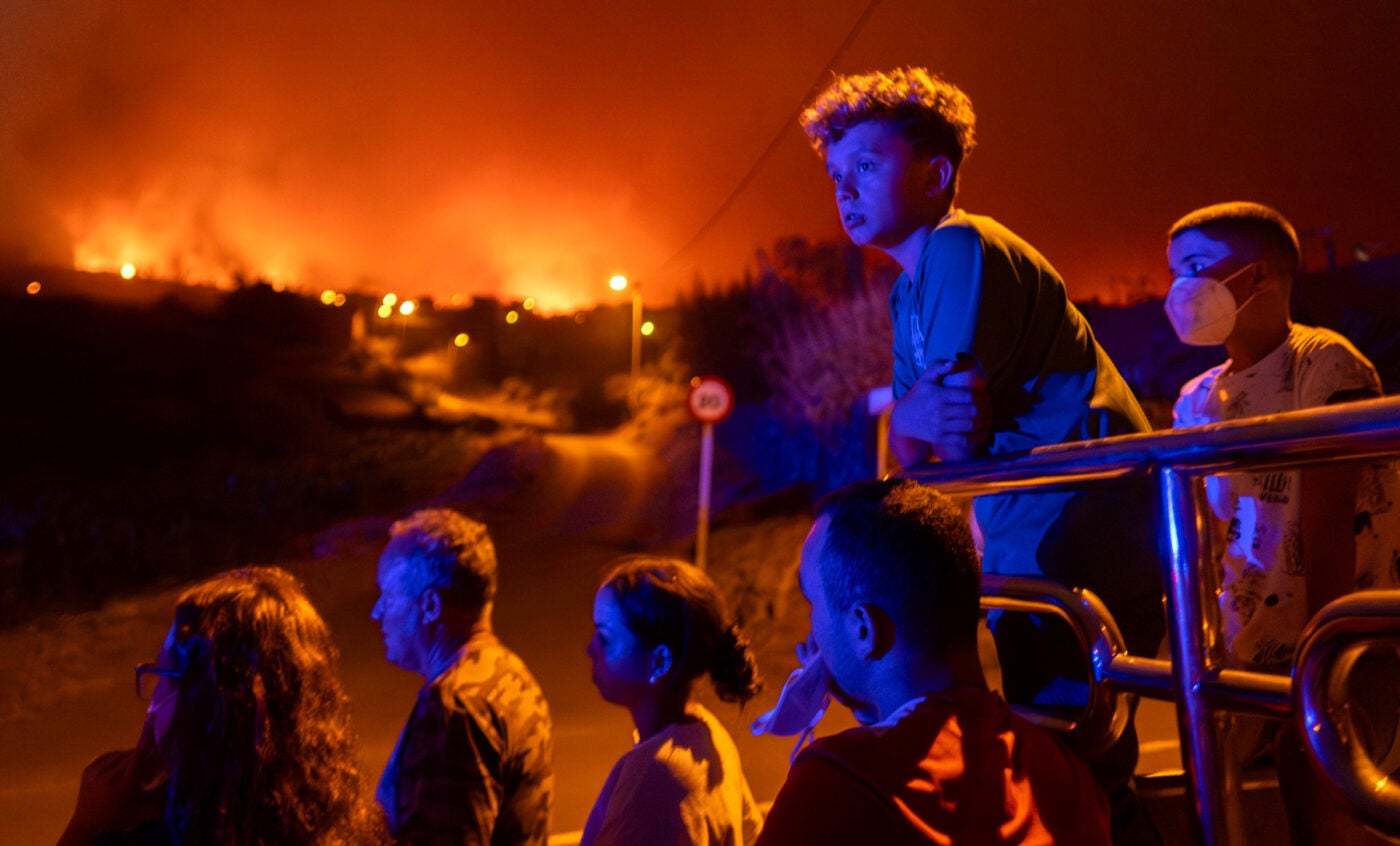
Opinion
Climate change’s hidden mental toll on children
This article was originally published by Think Global Health.
Climate change is the leading global health threat that humanity faces today. The warming planet brings catastrophic wildfires, extreme weather events, and relentless droughts—disasters that lead to increased pollution, migration, food scarcity, and the spread of infectious diseases.
The crisis endangers human health in many ways, but whereas its effects on the cardiovascular, respiratory, and immune systems are well documented, the consequences on brain health are just coming to light, especially in children.
Sign up for Harvard Public Health
Delivered to your inbox weekly.
A 2021 study published in Clinical Psychological Science suggests that heat waves negatively affect the mental well-being of children and adolescents, leading to a rise in mental health-related visits to emergency departments. A newer report, released last month in Nature Climate Change, reveals that climate change might be altering brain development and function to a greater extent than previously realized.
“We have known for a very long time how the environment we inhabit drastically impacts the human brain,” said Kimberly Doell, a senior scientist at the University of Vienna and the Nature Climate Change study’s lead author. “However, we are just starting to understand how the changing climate is negatively impacting the human brain.”
Similarly, the 2023 Mental Health and Our Changing Climate Children and Youth Report published by the American Psychological Association in October highlights that extreme weather events and exposure to air pollution can harm fetal development, increasing the likelihood of issues such as anxiety, depression, ADHD, educational shortcomings, diminished self-regulation, and the possibility of psychiatric disorders in later life.
Due to their rapid physical and brain development, immature immune systems, and limited ability to regulate body temperature, children are particularly susceptible to the negative impacts of climate change. “All children are vulnerable,” said Frederica Perera, the director of the Columbia Center for Children’s Environmental Health and the author of Children’s Health and the Peril of Climate Change, “but children in marginalized communities are hurt first and worst.”
The long-term and even transgenerational effects of climate change on children’s neurological health are a pressing concern. According to Perera, the need for strong government policies to accelerate the shift to clean energy and sustainable food production is urgent. Additionally, access to mental health care for children and adolescents, particularly in the most affected communities, needs to be expanded.
Other evidence shows that intensifying heat waves threaten adults’ neurological well-being as well. Extended heat exposure exacerbates symptoms of conditions such as multiple sclerosis and substance use disorders and can heighten suicide risk. It also accelerates cognitive decline, worsening conditions such as Alzheimer’s disease.
Beyond heat, air pollution from industrial activities, wildfires, and deforestation severely affects neural health. Prolonged exposure to fine particulate matter is linked to increased risks of stroke, cognitive decline, and the onset of dementia and mental disorders.
Climate change also enhances the spread of vector-borne diseases, posing new neurological challenges. Diseases such as Zika and West Nile virus are expanding their reach, leading to severe conditions such as encephalitis and paralysis.
Additionally, the psychological effects of climate change are significant yet often overlooked. Communities facing floods, wildfires, and displacement show increasing mental health issues, including post-traumatic stress disorder and anxiety, particularly among youth, underscoring the need for immediate mental health interventions.
“We have known for a very long time how the environment we inhabit drastically impacts the human brain.”
Kimberly Doell, senior scientist, University of Vienna
Maximizing the Brain’s Resilience Against Climate Change
The brain’s resilience is vital to adapting to environmental stressors caused by climate change. This adaptability helps the brain counteract damage but can also mask the extent of harm, potentially leading to irreversible damage if not addressed early. Timely intervention is crucial to prevent reaching a point of no return.
To enhance early detection, Doell recommends that health-care systems offer free screenings for brain damage even before any symptoms are noticeable. This proactive step would allow individuals to take preventive actions for their brain health sooner.
The brain’s plasticity offers hope. Implementing effective strategies to mitigate and adapt to climate change is important to prevent further neurological damage and facilitate recovery. This effort includes reducing environmental harm to support brain health and leveraging the brain’s natural repair mechanisms.
Perera highlights the progress made with the 2022 Inflation Reduction Act in promoting renewable energy and community involvement. However, she emphasizes the need for more comprehensive actions at national and state levels, combining climate and clean air policies with social measures to address climate and environmental injustice globally.
Public health responses should shift focus from addressing only immediate crises to the long-term neurological effects of climate change. Such steps mean improving health-care infrastructure and integrating brain health into climate resilience strategies.
More research is necessary to deepen understanding of how climate change affects brain health, develop targeted interventions, and inform public health policies. Doell urges more neuroscientists to engage in this research area, which will only grow more critical as climate change deepens. The UK Meteorological Office predicts that the global average temperature could temporarily cross a 1.5-degree Celsius threshold next year.
Effective response to these challenges requires collaboration across public health, environmental policy, and neurological research. Policymakers, health-care professionals, environmental scientists, and neurologists need to work together to mitigate immediate health impacts and build resilience against the long-term neurological effects of climate change.
“All children are vulnerable, but children in marginalized communities are hurt first and worst.”
Frederica Perera, director, Columbia Center for Children’s Environmental Health
COP28: A Landmark for Health in Climate Action
December 3 marked a historic day at COP28 with the first-ever Health Day, leading to more than 120 countries endorsing the Climate and Health Declaration. This milestone signals a major step in including health in climate change discussions.
World Health Organization Director-General Dr. Tedros Adhanom Ghebreyesus emphasized the importance of this event, stating, “This is the first COP Health Day, but it must not be the last. Health must be a permanent feature of the climate change agenda from now on.”
Going forward, a unified global approach is essential. Combining scientific research, public health strategies, and proactive policymaking is critical to protecting brain health from the detrimental impacts of climate change.
Image: Residents try to reach their houses as police block the area as fire advances in La Orotava in Tenerife, Canary Islands, Spain in August 2023. Firefighters battled through the night to try to contain the worst wildfire in decades on Tenerife, a major tourist destination. The fire in the north of the island started Tuesday night and has forced the evacuation or confinement of nearly 8,000 people. (Arturo Rodriguez / AP Photo)


